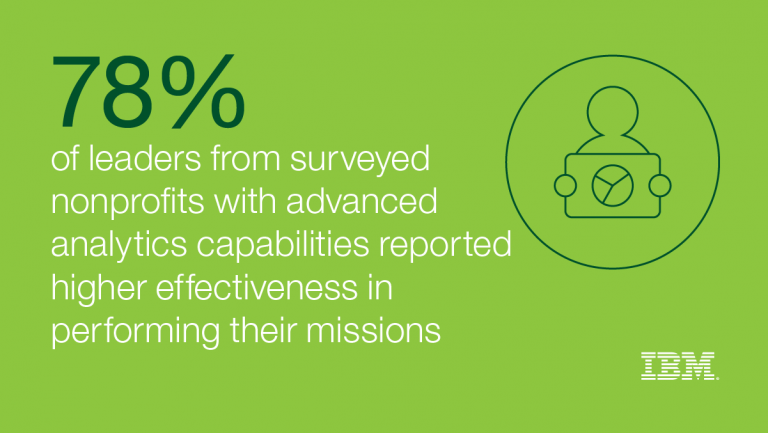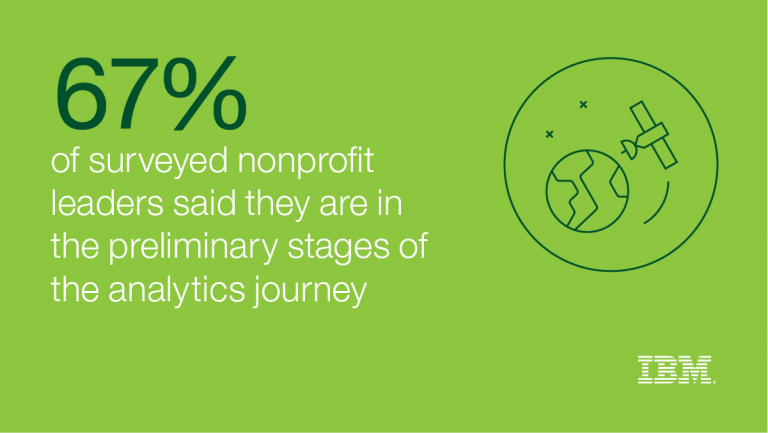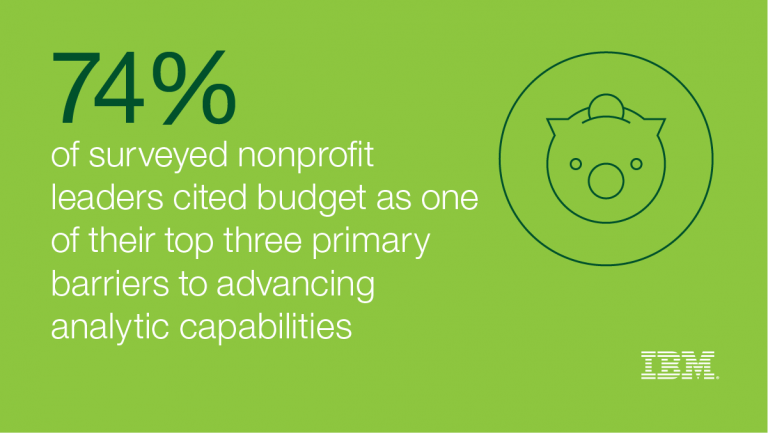The rise of digital platforms coupled with increasing donor demand for transparency means nonprofit organizations need to leap into action with their data and analytics capabilities before they lag others and lose out.
Nonprofit organizations often fill critical gaps in the social fabric of the world, yet few can afford to leverage technologies that are connecting commercial businesses in the digital marketplace. To remain relevant, nonprofits must ensure their data and analytics capabilities are keeping pace.
In partnership with Independent Sector and the IBM Corporate Citizenship and Corporate Affairs, the IBM Institute for Business Value conducted a global survey to understand current data practices and barriers to advancement. More than 300 nonprofit leaders from 34 countries responded, revealing crucial insights about the state of analytics maturity in this sector:
The benefits of analytics are not just hype
Organizations that are more advanced in data and analytics practices are more effective in areas critical to their success. Surveyed nonprofits with advanced analytics capabilities reported:
- Better performance of their missions
- More efficient operations
- Increased staff productivity

Two-thirds of nonprofits are still in the early stages of analytics
Data is becoming even more important for nonprofits as they strive to move beyond measuring program outputs and demonstrate broader social impact. Nonprofits can use operational data not only to derive insights, but also to predict and make informed decisions.
Despite the benefits, 67 percent of surveyed nonprofits are in early stages of the analytics journey — with ample opportunities to advance.
- Thirty-seven percent of surveyed nonprofits said they use ad hoc analytics (for example, using analytics on an as-needed basis).
- Seventeen percent said they use descriptive analysis (for example, explaining what happened in the past).
- Thirteen percent said they use diagnostic analytics (for example, discerning past trends to influence decisions).
- Fifteen percent said they use predictive analytics (for example, using past events and trends to anticipate future outcomes).
- Thirteen percent said they use prescriptive analytics (for example, assessing the probability of potential outcomes to optimize results).
- Five percent said they use cognitive or artificial intelligence systems (for example, using self-learning systems to discern patterns and probabilities from complex data).

Nonprofit leaders reported three major barriers to advancing analytics
- Seventy-four percent of surveyed nonprofits indicated funding is a primary barrier. Our survey uncovered a marked disparity between sources for organizational funding and sources for data funding. Many sources of funding are restricted for programmatic use.
- Forty-eight percent indicated technology is a primary barrier. Nonprofits aspire to mature data capabilities, but technological complexity inhibits them.
- Forty-one percent indicated talent is a primary barrier. Data professionals earn premium wages, and nonprofits struggle to train and hire the right skills.

To make meaningful advances, nonprofits must commit to becoming data-driven, creating a data-centered culture and collaborating effectively with partners, donors and others within their networks. Organizations can begin to leap ahead by:
- Capitalizing on advances in technology
- Upskilling staff
- Rationalizing the use of internal and external talent
- Aligning funds to support data-driven practices
- Engaging in collaborative ecosystems.
Read the full report for more information and pragmatic guidance to help nonprofits advance their use of analytics.
Check out the digital experience to explore findings and receive personalized recommendations to accelerate your nonprofit’s capabilities.
Meet the author


